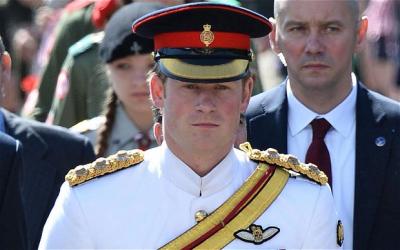Harry honours Monte Cassino fallen

CASSINO-Prince Harry paid tribute Monday together with veterans, their families, British, US and New Zealand soldiers, and hundreds of visitors, to those who died in one of WW2's bloodiest battles. They gathered at the Commonwealth War Cemetery at the foot of Monte Cassino, a stronghold whose capture was central to the Allies’ Italian Campaign of 1944.
Upon his arrival, the prince, dressed in the Household Cavalry white dress uniform, took a moment to sign the book of remembrance for those fallen in the six-month struggle against the Nazi forces positioned outside the Benedictine monastery, and soon afterwards joined the procession led by the Pipers of The Royal Highland Fusiliers of the Royal Regiment of Scotland and including members of the Royal British Legion, the 28th Maori Battalion and the US Honour Guard, towards the cemetery’s focal point, the Cross of Sacrifice.
Accompanied by the officiating ministers, Chaplain General of the British Army Rev Jonathan Woodhouse, Archdeacon of Italy and Malta Venerable Jonathan Boardman, and the British Ambassador to Italy, Christopher Prentice, the prince walked solemnly in front of the crowd of onlookers, aligned along the path leading up to the grey stone tablets of the Cassino memorial, commemorating over 4.000 Commonwealth servicemen whose graves are not known.
“It is a nice day today,” Ven. Boardman started his welcome speech, “but it was not so in May 1944 when the soldiers fought in a terrible rain.” The Minister’s words opened a 45-minute service, during which Prince Harry and many of the honourable guests remained standing beneath the Cross of Sacrifice, flanked by two canopies where the veterans were seated. In his speech, the Archdeacon called upon those gathered in the cemetery to consider the meaning of the great sacrifice made by the Allied soldiers “so that all people may live in freedom and peace,” while pointing out the tragic ambiguity of a “place of sun and friendship,” which witnessed so much “cruelty and suffering.”
Purcell’s “Lament” served as a musical interlude, followed by an excerpt from the Gospel of St Matthew read out by the British Ambassador. “Blessed are the peacemakers,” Mr Prentice read to the assembled, “for they will be shown mercy. Blessed are those who mourn, for they will be comforted.”
“Monte Cassino was a test of courage for the most loyal soldiers,” were the opening words of Rev. Woodhouse’s address a few minutes later. “Stakes were high, but behind history there is the sacrifice of servicemen apart from home, and especially those who never came home.”
“War is a brutal business,” climaxed his speech the Chaplain General, “however necessary to establish peace. It is therefore vital that the sacrifice is rightly recognised.”
Veteran Theo Davies of the 6th Battalion of the Queens Own Royal West Kents was the one to deliver a poignant exhortation, and the simple promise made to the fallen – “We will remember them” – met with a thundering choral response from the hundreds gathered. The two minutes of silence which followed had the prince and all those standing in the shadow of the Cassino memorial freeze in a solemn reflection, which set the mood for the service’s culminating moment, the laying of the wreaths at the Cross of Sacrifice by the prince and representatives of many nations whose soldiers lost their lives on the battlefield of Cassino.
An enthusiastic applause arouse after the singing of the British and Italian national anthems, relieving the solemnity of the scene just before the Chaplain General’s final blessing and wishes of “rest for the departed” and “peace and concord for the living.”
After the service Prince Harry greeted the veterans and members of the British, U.S. and New Zealand military forces, and then moved away towards a remote corner of the cemetery to take a few moments for a quiet reflection between the rows of headstones of fallen soldiers.
Among the veterans attending was Fred Mason from the West Midlands, who fought in the Italian Campaign alongside many of the soldiers commemorated at Cassino, and for whom the memory of spring ’44 is still very much alive. “It does bring memories, especially when you go to the cemeteries and you see your friends are still buried there,” reflected Mr Mason. “I was only 19 myself when I was there. It’s a bit emotional, but I think it’s worth coming back.”
“It’s a pity some of the young people can’t come and see this,” added the English veteran, “It is to be hoped that they don’t have to go through what we went through, and live in peace.”
But even though the young were in the minority at Monday’s service, Ven. Boardman, who already presided at two previous anniversaries of the battles of Cassino, is convinced that such commemorations can still send an important message valid for the new generations.
“Especially when so much emphasis is laid on it as is being done here, and with a young person like Prince Harry being involved in it, it is wonderful because he shows that it clearly has meaning,” commented the Archdeacon. “There are graves of 16-year olds in this place, and it makes a huge impact when young people realise how young the people were who died here,” added Ven. Boardman, “and though it seems a very heavy cost to have paid, the value of it is still being felt.”


